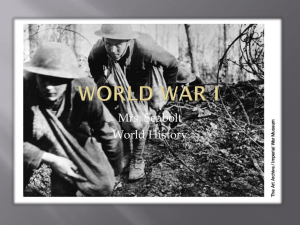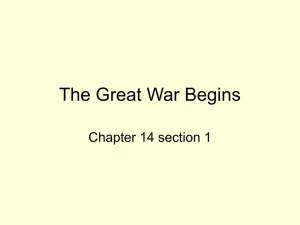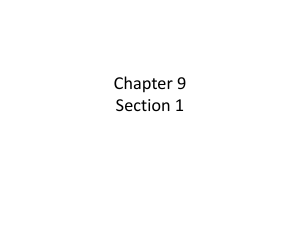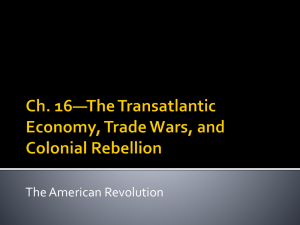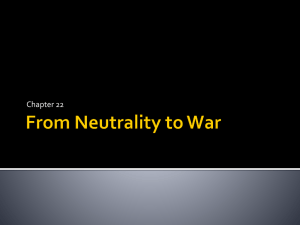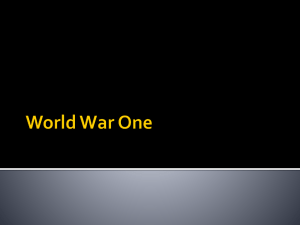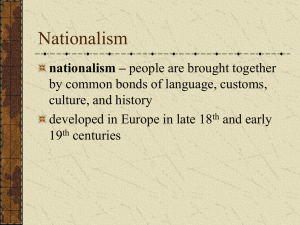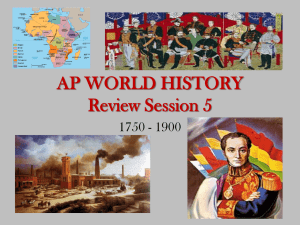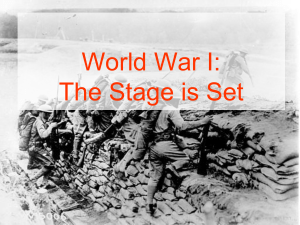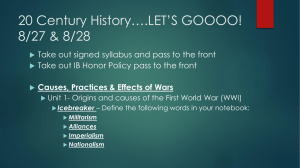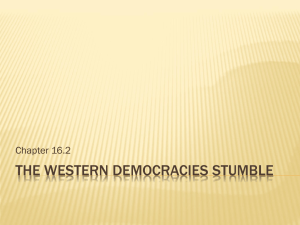The Powder Keg of Europe
advertisement
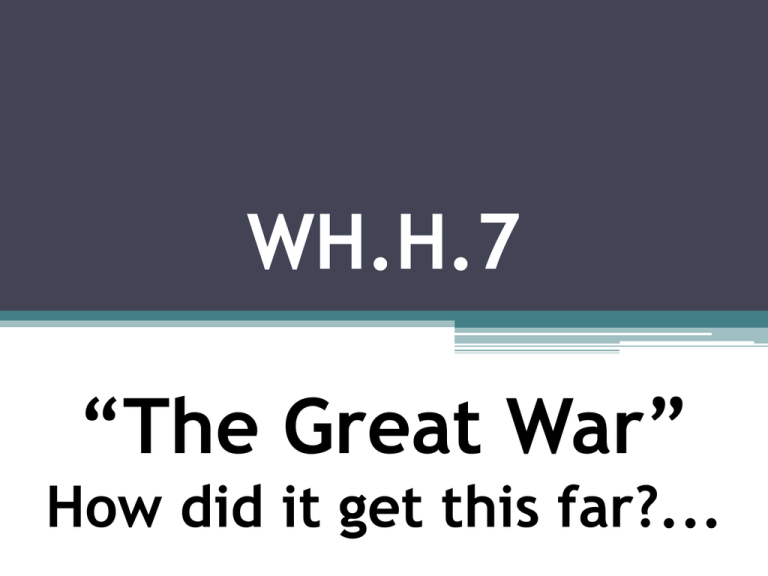
WH.H.7 “The Great War” How did it get this far?... WH.H.7: Understand how national, regional, and ethnic interests have contributed to conflict among groups and nations in the modern era. Focus Question: How did international competition and nationalism increase tensions in Europe? Generalizations: • World conflicts can cause domestic priorities to shift. • Nationalism may have both a positive and negative impact on a nation as well as the global environment. • Idealism often wanes in the face of conflict. Essential Questions: • How did the Industrial Revolution lead to Imperialism? • What were the European motives for imperialism during the 19th century? • What were the positive and negative effects of nationalism? • How did militarism, alliances, imperialism, and nationalism help lead to World War I? WORLD WAR I REMEMBER THE M.A.I.N. CAUSES!!!! MILITARISM • • the process of building up military strength for the purpose of intimidating other countries If one nation builds up its military, then all others must do so as well THE ALLIANCE SYSTEM BY MAKING AGREEMENTS TO FIGHT ALONG OTHER COUNTRIES MEANT THAT ANY DISPUTE FROM DIFFERENT ALLIANCES THREATENED TO BRING ALL COUNTRIES INTO CONFLICT Confusing (& secret) alliances • 1882: Germany allied with Austria & Italy • 1894: France allied with Russia • 1904: Britain allied with France • Germany secretly allied with Ottomans • Britain secretly allied with Japan IMPERIALISM THE COMPETITION FOR RESOURCES, COLONIES, EMPIRE, AND WORLD POWER WAS CREATING RIVALRIES AND HOSTILITIES BETWEEN NATIONS!!!! NATIONALISM • Nationalism = intense pride in one’s own country or nationality • European states became more concerned with their own interests than with maintaining the peace that had held for close to 100 years Nationalism FANATICAL PATRIOTISM TOWARDS ONES HOMELAND AND NATION THAT LEADS TO CONFLICTS, DECLARATIONS OF INDEPENDENCE, AND INCREASED TENSIONS AMONGST EUROPEAN NATIONS Archduke Franz Ferdinand • 1863 – 1914 • Nephew of Austrian Emperor Franz Joseph & heir to the throne of Austria • Married Countess Sophie who was beneath him in station, essentially giving up his rights to the throne • Sent on an official state visit to Sarajevo in the Austrian-held province of Bosnia Assassination • June 28, 1914 • Franz Ferdinand and his wife were assassinated by a Bosnian nationalist • Austria demanded that Serbia, who had supposedly supported the assassins, turn over anyone who was involved in the plot When Serbia refused, Austria declared war Russia enters the war • Russia, which supported a policy of Pan-Slavism (unity of all Slavic peoples), demonstrated its support for Serbia by declaring war on Austria Germany, under their monarch Kaiser Wilhelm II, sided with Austria France was allied with Russia Germany invaded neutral Belgium to position themselves to attack France Britain, who was allied with Belgium, declared war on Germany The Two Sides of WWI • “The Central Powers” • Germany, Austria, & the Ottomans • Later called… Triple Alliance • “The Triple Entente”: • Great Britain, France, & Russia • Later called… The Allied Powers The U.S. & The War Woodrow Wilson • 1856 – 1924 • 28th President (1913 – 21) • A pacifist, he supported US neutrality (taking no sides) and isolationism (avoiding foreign conflicts) • His Secretary of State, William Jennings Bryan, was also dedicated to neutrality Americans Take Sides • Some were pro-Germany: German immigrants, Irish immigrants (who were more anti-British) • Pro-British: ▫ most Americans identified with Britain because of having same language & culture • US businesses traded heavily with Britain, US banks had loaned Britain over $2 billion (had only loaned $27 million to Germany) German U-boats • Germany attempted to prevent Britain & France from obtaining supplies from overseas by using submarines to attack shipping • Feb. 1915: Germany announced unrestricted submarine warfare in the waters around Britain – any ships could be attacked without warning The Lusitania • May 7, 1916: German U-boat attacked and sank the British passenger liner Lusitania, killing nearly 1200 civilians, including 128 Americans • Wilson responded by warning Germany that it had a responsibility to protect noncombatants or risk war with the US The Sussex Pledge • After a 2nd attack in March 1916 that injured Americans aboard the French ship Sussex, Wilson issued a sterner warning to Germany • Germany did not want the US to enter the war, so they promised to stop attacking merchant ships without warning • Wilson, who did not really want to enter the war, used the so-called Sussex Pledge as a political tool for getting re-elected Election of 1916 • Wilson won re-election on the slogan “He kept us out of war!” • Isolationists’ numbers were dwindling though as the war in Europe grew more intense and US interests were threatened The Zimmermann Telegram • January 1917: German Foreign Minister Arthur Zimmermann sent orders to the German ambassador in Mexico to offer Mexico an alliance with Germany • Germany would help Mexico reclaim Texas, California, and the Southwest if Mexico could keep the US occupied and out of the war in Europe Zimmermann Telegram Backfires • Zimmermann’s note was intercepted by the British and published in US newspapers • Most Americans were enraged and began to demand war Germany’s New Plan • Germany decided they needed to end the war before the US could mobilize • Feb. 1, 1917: resumed unrestricted submarine warfare in the hopes they could force a quick British surrender • Began to attack US merchant ships without warning, prompting Wilson to take action US Declares War April 2, 1917: Wilson appeared before Congress and asked for a declaration of war against Germany The Senate approved war by a vote of 82 to 6, the House by a vote of 373 to 50 -In his speech, Wilson said, “The world must be made safe for democracy. Its peace must be planted upon the tested foundations of political liberty. We have no selfish ends to serve. We desire NO conquest, no dominion.”-(imperialism!)
